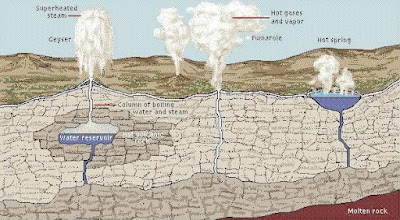 Formation of Geysers
Formation of GeysersGeysers are caused when underground chambers of water are heated to the boiling point by volcanic rock. When heat causes the water to boil, pressure forces a superheated column of steam and water to the surface. Because most geothermal reservoirs are capped by overlying rock, the heated water cannot escape, remaining underground instead. If a geothermal reservoir is sufficiently close to the surface, the heated water can be piped to the surface and used to produce energy.
In certain areas, water seeping down through cracks and fissures in the crust comes in contact with this hot rock and is heated to high temperatures. Some of this heated water circulates back to the surface and appears as hot springs and geysers. However, the rising hot water may remain underground in areas of permeable hot rock, forming geothermal reservoirs. Geothermal reservoirs, which may reach temperatures of more than 350° C (700° F), can provide a powerful source of energy.



